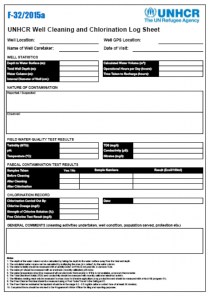
This is the standard UNHCR well cleaning and chlorination template for refugee settings available in PDF and MSExcel formats. The form should be completed each time a hand dug well is cleaned, chlorinated and tested for faecal coliforms. The form is available in MSExcel format so WASH actors can adapt the content to the context.
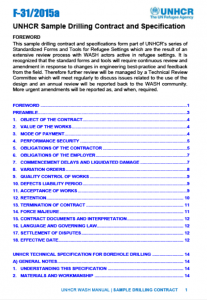
This is the standard UNHCR borehole drilling contract template for refugee settings available in PDF and MSWord formats. The contract also includes a technical specification for drilling which defines the following borehole construction requirements: drillpipe diameters; casings and screens; hydrogeological survey; identification of drilling sites; abandoned boreholes; drilling equipment and depths; plumbness and alignment; temporary lid; artificial and natural gravel pack; well development; sanitary seal; pumping tests; borehole yields; borehole pollution; borehole disinfection; and water samples.
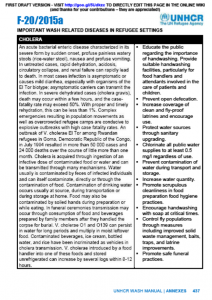
This document provides a quick summary of the most important WASH related diseases for refugee settings and includes a list of recommended control strategies.
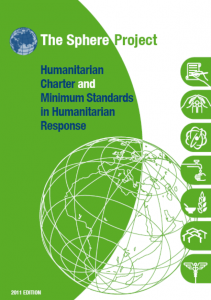
The Sphere Handbook is one of the most widely known and internationally recognized sets of common principles and universal minimum standards for the delivery of quality humanitarian response.
Tags: Bathing Facilities, Capacity Building, Communal Toilets, Cross Cutting, Disability, Disease Vector Control, Drainage, Environment, Excreta Management, Gender, Gender Based Violence, Grey Water Disposal, Handwashing with Soap, Household Water Treatment, Human Right to Water / Sanitation, Hygiene Promotion, Laundering Facilities, Menstruation Hygiene Management, Piped Water Networks, Protection, Public Health, Solid Waste Management, WASH Assessments, WASH Coordination, WASH Monitoring, WASH Programme Management, Water Quality Testing and Surveillance, Water Safety Plans, and Water Supply. Languages: English. Organisations: SPHERE. Categories: WASH Reference Documents.
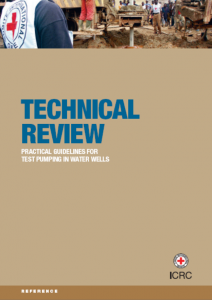
Pumping tests are a practical way of obtaining an idea of the borehole’s efficiency and its optimal production yield. Much of the specialized knowledge and technical expertise needed for this purpose can be gained from the standard literature. However, field operations in remote areas or in difficult conditions often require flexibility and imagination in avoiding or solving technical problems. These guidelines are intended mainly as a practical tool and
therefore contain a minimum of theory. They are aimed at water and habitat engineers working in the field who are undertaking or supervising borehole drilling or rehabilitation
programmes and are not conversant with pumping test procedures.
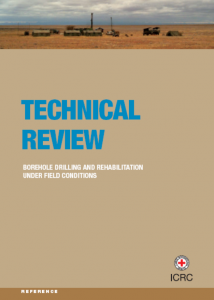
Constructing, or repairing, boreholes requires specialized knowledge and technical expertise, much of which can be gained from the standard literature; but field operations in remote areas or in difficult conditions often require flexibility and imagination in avoiding and solving technical problems. This review is intended as a decision-making tool to assist in making cost-effective choices between borehole drilling methods, and in deciding whether to drill new boreholes or rehabilitate existing sites.
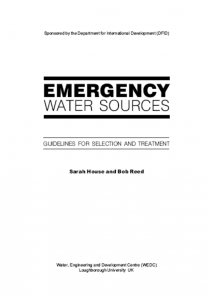
These guidelines have been designed to help those involved in the assessment of emergency water sources to collect relevant information in a systematic way, to use this information to select a source or sources and to determine the appropriate level of treatment required to make the water suitable for drinking.
Tags: Boreholes, Bulk Water Treatment, Drilling, Groundwater, Hand Dug Wells, Handpumps, Household Water Treatment, Piped Water Networks, Rainwater Harvesting, Solar Pumping, Spring Protection, WASH Assessments, WASH Monitoring, WASH Programme Management, Water Prospection and Investigation, Water Pumping, Water Quality Testing and Surveillance, Water Safety Plans, Water Storage, Water Supply, and Water Tankering. Languages: English. Organisations: WEDC. Categories: WASH Emergency Guidelines and WASH Reference Documents.
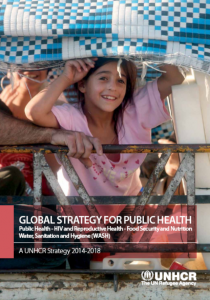
This document describes UNHCR’s global strategy for public health through a set of guiding principles and strategic approaches including protection; age, gender and diversity; equity; access; sustainability; community empowerment; appropriateness and reliability; partnerships and coordination; capacity building; communication and advocacy; integrated approaches; measurement and monitoring; and innovation. The document describes strategic objectives and enabling actions per sub-sector (Public Health, HIV and Reproductive Health, Food Security and Nutrition, and WASH).
Tags: Capacity Building, Disease Vector Control, Excreta Management, Gender, Gender Based Violence, Human Right to Water / Sanitation, Hygiene Promotion, Protection, Public Health, Value for Money, WASH Coordination, WASH Monitoring, WASH Strategy Development, and Water Supply. Languages: English. Organisations: UNHCR. Categories: WASH Guidelines, WASH Operational Guidelines, WASH Policy Guidelines, and WASH Reference Documents.
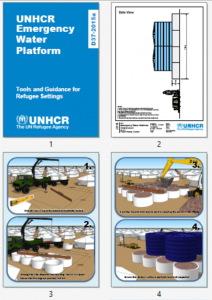
This document contains materials to help UNHCR and WASH actors construct emergency raised water platforms in refugee settings. The package includes: Technical Drawings; Step by Step Construction Drawings; Bills of Quantity; Material and Workmanship Specifications; and Design Calculations.
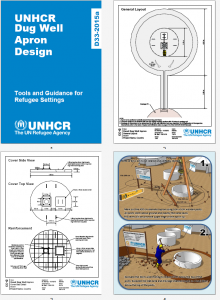
This document contains materials to help UNHCR and WASH actors construct hand dug well aprons in refugee settings.The package includes: Technical Drawings; Step by Step Construction Drawings; Bills of Quantity; Material and Workmanship Specifications; and Design Calculations.
 English
English










